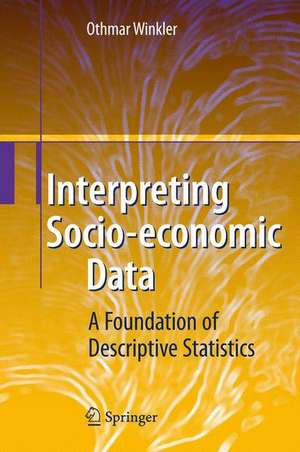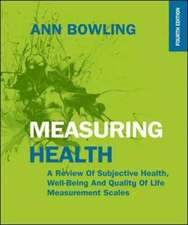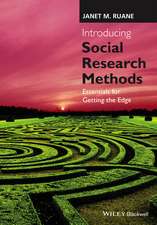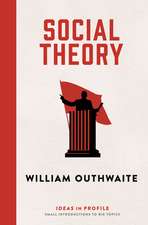Interpreting Economic and Social Data: A Foundation of Descriptive Statistics
Autor Othmar W. Winkleren Limba Engleză Hardback – 20 aug 2009
| Toate formatele și edițiile | Preț | Express |
|---|---|---|
| Paperback (1) | 639.73 lei 6-8 săpt. | |
| Springer Berlin, Heidelberg – 21 noi 2014 | 639.73 lei 6-8 săpt. | |
| Hardback (1) | 646.11 lei 6-8 săpt. | |
| Springer Berlin, Heidelberg – 20 aug 2009 | 646.11 lei 6-8 săpt. |
Preț: 646.11 lei
Preț vechi: 760.13 lei
-15% Nou
Puncte Express: 969
Preț estimativ în valută:
123.63€ • 134.84$ • 104.25£
123.63€ • 134.84$ • 104.25£
Carte tipărită la comandă
Livrare economică 24 aprilie-08 mai
Preluare comenzi: 021 569.72.76
Specificații
ISBN-13: 9783540687207
ISBN-10: 3540687203
Pagini: 284
Ilustrații: XVI, 265 p.
Dimensiuni: 155 x 235 x 25 mm
Greutate: 0.58 kg
Ediția:2009
Editura: Springer Berlin, Heidelberg
Colecția Springer
Locul publicării:Berlin, Heidelberg, Germany
ISBN-10: 3540687203
Pagini: 284
Ilustrații: XVI, 265 p.
Dimensiuni: 155 x 235 x 25 mm
Greutate: 0.58 kg
Ediția:2009
Editura: Springer Berlin, Heidelberg
Colecția Springer
Locul publicării:Berlin, Heidelberg, Germany
Public țintă
ResearchCuprins
Developments in Socio-Economic Statistics.- From the Facts in Society to Socio-Economic Data.- Structure and Nature of Socio-Economic Data: The Aggregates.- Ratios in the Social Sciences.- Interpreting Longitudinal Data, Part 1 #x2013; Looking to the Past.- Longitudinal Analysis, Part 2 #x2013;Looking to the Future.- Longitudinal Analysis, Part 3 #x2013; Index Numbers.- Cross Sectional Analysis in One Dimension.- Cross Sectional Analysis in More Than One Dimension.- Socio-Economic Statistics and Probability.- The Interface between Statistics and Accounting.- Socio-Economic Statistics and Geography.
Recenzii
From the reviews:
“Winkler’s book … covers general issues in the field of economic and social data. … targets all experienced statisticians and econometricians who find it relevant to think carefully about the origin and properties of the data they use. In fact, the ideas presented in the book are the result of several decades of teaching statistics and providing statistical consultancy by the author.” (Peter Winker, Journal of Economics and Statistics, Vol. 230 (3), June, 2010)
“Professor Winkler has done a remarkable job of addressing many of the concerns that confront a teacher of statistics in a school of business. … any teacher or professional who must confront and analyze socioeconomic statistics should profit from this book.” (Mark A. McComb, Technometrics, Vol. 52 (4), November, 2010)
“Interpreting Economic and Social Data offers a provocative look at statistical methods that are often neglected in the analysis of socioeconomic data. And, if you are the type of person who can look past statements that categorize all traditionally trained statisticians as overly enamored with probability and unconcerned with data context, you will certainly find a thorough treatment of all aspects of socioeconomic statistics, from the definition of a ‘statistical counting unit’ to the analysis of such units, in this text.” (Monnie McGee, The American Statistician, Vol. 66 (2), May, 2012)
“The author presents a book on statistics and socio-economic data. … The book is intended for everyone who has to deal with data about social events, and consists of twelve chapters. … the author presented a fresh view on several fields of statistics and its applications and demonstrated where improvements should be made in the future.” (Herbert S. Buscher, Zentralblatt MATH, Vol. 1204, 2011)
“Winkler’s book … covers general issues in the field of economic and social data. … targets all experienced statisticians and econometricians who find it relevant to think carefully about the origin and properties of the data they use. In fact, the ideas presented in the book are the result of several decades of teaching statistics and providing statistical consultancy by the author.” (Peter Winker, Journal of Economics and Statistics, Vol. 230 (3), June, 2010)
“Professor Winkler has done a remarkable job of addressing many of the concerns that confront a teacher of statistics in a school of business. … any teacher or professional who must confront and analyze socioeconomic statistics should profit from this book.” (Mark A. McComb, Technometrics, Vol. 52 (4), November, 2010)
“Interpreting Economic and Social Data offers a provocative look at statistical methods that are often neglected in the analysis of socioeconomic data. And, if you are the type of person who can look past statements that categorize all traditionally trained statisticians as overly enamored with probability and unconcerned with data context, you will certainly find a thorough treatment of all aspects of socioeconomic statistics, from the definition of a ‘statistical counting unit’ to the analysis of such units, in this text.” (Monnie McGee, The American Statistician, Vol. 66 (2), May, 2012)
“The author presents a book on statistics and socio-economic data. … The book is intended for everyone who has to deal with data about social events, and consists of twelve chapters. … the author presented a fresh view on several fields of statistics and its applications and demonstrated where improvements should be made in the future.” (Herbert S. Buscher, Zentralblatt MATH, Vol. 1204, 2011)
Textul de pe ultima copertă
"Interpreting Economic and Social Data" aims at rehabilitating the descriptive function of socio-economic statistics, bridging the gap between today's statistical theory on one hand, and econometric and mathematical models of society on the other. It does this by offering a deeper understanding of data and methods with surprising insights, the result of the author's six decades of teaching, consulting and involvement in statistical surveys. The author challenges many preconceptions about aggregation, time series, index numbers, frequency distributions, regression analysis and probability, nudging statistical theory in a different direction. "Interpreting Social and Economic Data" also links statistics with other quantitative fields like accounting and geography. It is aimed at students and professors in business, economics and social science courses, and in general, at users of socio-economic data, requiring only an acquaintance with elementary statistical theory.
Caracteristici
This compendium follows a unique approach: to comprehend the concepts of statistical analysis rather than just applying it Essential tool for everybody involved in empirical work Includes supplementary material: sn.pub/extras















